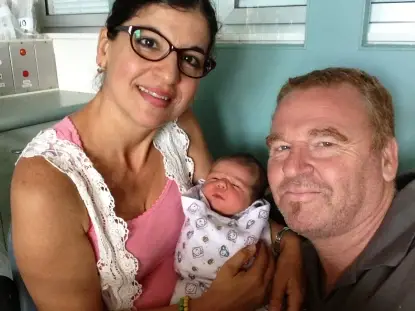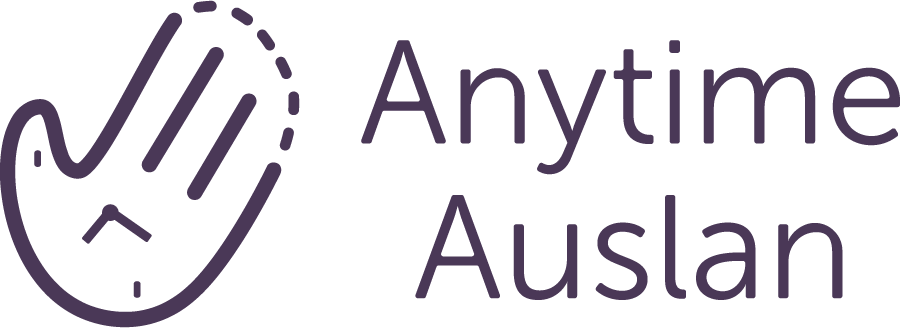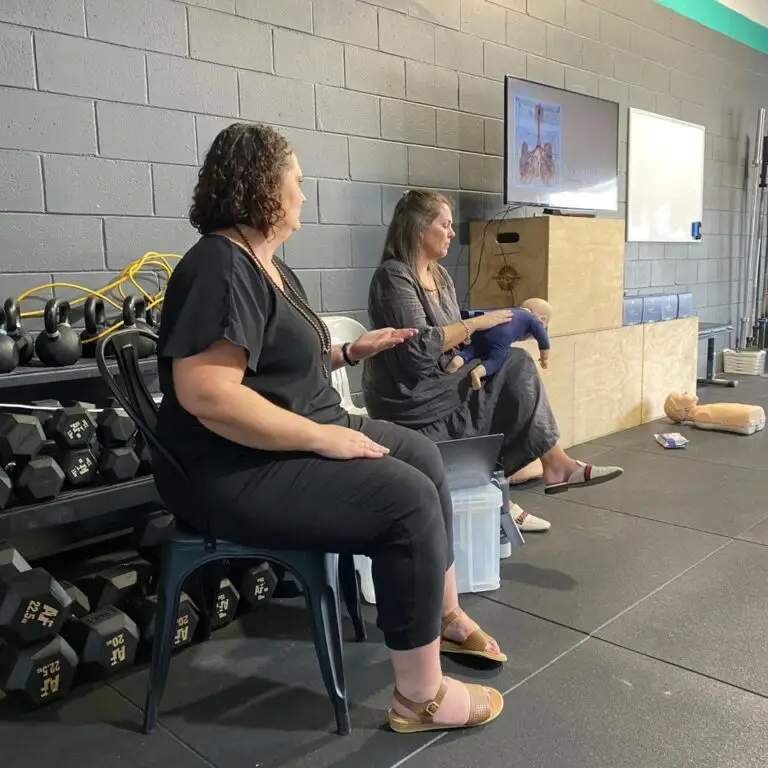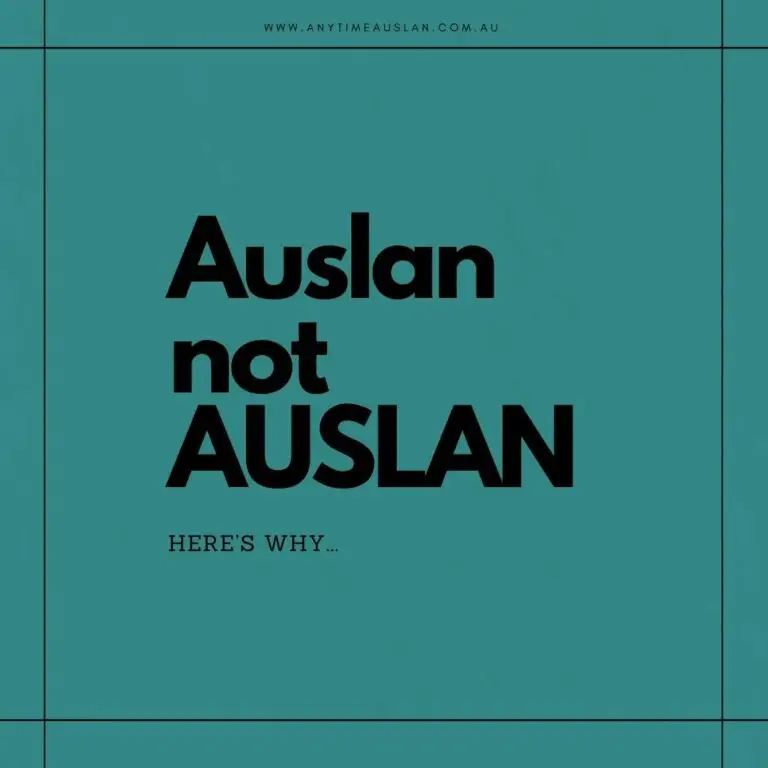Please scroll to bottom of page for Auslan Translation

One day I took my bean bag to university and carried it around all day. I even sat on it during lectures. I didn’t have a licence at the time, so I took the bean bag on the bus with me. I hauled it all around the university, caught a bus to Carmela’s home and delivered it to her. It was worth it, she at least had somewhere to sit.
This was in 1987, I think. The photo that popped up on my screen was of Carmela with her husband and first grandchild. I never got to meet her husband or grandchild. Over the years we had drifted apart. Caught up in our own lives. We found each other again some years ago, on Facebook of course. She would often comment on my photos of flowers. She knew the names of many flowers and would tell me what they were. I used to joke that the technical term for the flower was, “Pink Pretty Flowers.” (Replace pink with whatever colour the flower was at the time.)
We lived not far from each other in Adelaide. We kept saying that we would catch up for coffee, but life got in the way. Carmela passed away from cancer in 2021. I was devastated. I hadn’t even known that she was ill. I was later to find out that she had fought cancer for 10 years. It hit me quite hard. It made me realise that I needed to value friends and acquaintances more. Because in a shot they could be gone.
The photo in question was on her daughter’s business website, her daughter, Claudia, is the CEO and founder of Anytime Auslan, she is a fabulous interpreter and I have been lucky to have her interpret for me on occasion when I worked in the NDIS space. Claudia had written an article about Carmela’s struggle with the health system in South Australia as she fought her cancer. Specifically, around access to Auslan interpreters. This inspired me to write this third article in the Deja Vu series. I don’t mind telling you all that I am a bit teary as I write it. Please read Claudia’s article, it is essential reading – CLICK HERE TO READ
I am struggling to put into words about how I feel. I just cannot fathom having to be the one who has to interpret that one’s mum is dying to her Deaf dad. What is more harrowing is that Claudia, this grieving daughter and incredible human being, had to interpret the doctors’ words that her mother was dying TO HER MOTHER. This makes me sad, horrified and furious all at the same time. The below is what Claudia had to endure:
“The doctor then asks to speak with mum. I go into mum’s room with the doctor, she has just woken up. The doctor sits down and says to mum “I just want to let you know that we have tried everything to help, so we have just told your husband and children that we think there is only a few more days, so it’s time to ask all your loved ones to come and say their goodbyes”. She doesn’t respond, the doctor repeats himself and says, “We are really sorry we couldn’t help; nothing seems to be working, we think you may die.” She is the most unresponsive that I have ever seen her, and she doesn’t say much back. Now it was a waiting game, to see whether she was sick with an infection or if the cancer had spread.”
Just sit back and allow that to sink in. You, the daughter/son, have to tell your mum that she is about to die. You’re already struggling with you’re own grief and own emotions. You have to be the one to make sure your mum understands that she is about to die. Let the true magnitude of this sink in! And why has this situation arisen? Because our health system, despite the fact that it is legislated to do so, won’t make the effort to book and pay for an Auslan interpreter. Simple and essential communication access that they will not provide.
Carmela survived, by the way, and lived for a few more years. But this was what she had to endure for ten years as she fought her illness. It is beyond appalling. That Claudia was the one, along with her brother, who had to fill in the gaps that the health system would not provide, that is a scandal. This makes me beyond angry. I do understand there are other factors such as unavailability of interpreters because of high demand. I also understand that many interpreters will avoid palliative care work as they find it too difficult emotionally to deal with.
Even so, what Claudia, Carmela and their family had to endure should not be allowed to happen.
In 2013 I was admitted to hospital with severe abdominal pains. In emergency I was seen by an Asian doctor with a strong accent who I could not understand. On being admitted I had told the reception that I needed an interpreter. They refused to book me one. I told the Asian doctor that I needed one. I asked him to write notes until I could get one. He ignored me completely and refused to even write. I was in Sydney at the time for a work meeting, not home in Melbourne.
Instead, this idiot resorted to mime and gesture to ask me if I had had a bowel movement. He mimed sitting on the toilet whilst grimacing at the same time. He bent over and put his hand to his bum and made finger movements as if there was an explosion coming out of his bum. Of course, I knew what he was asking but I refused to acknowledge that I had understood. Even in my severe pain I was angry that I was being infantilised in this way. I refused to cooperate.
As it turned out, I needed my gall bladder removed. I was not to find this out until more than 24 hours later. They had tried to tell me but I had not understood. 24 hours later they sent in the specialist who explained it to me in writing. The specialist was Asian too, and I couldn’t lipread him either. I was to be in hospital for a further two weeks due to complications. I was lucky that friends helped me out because I arrived in Sydney with only a spare pair of underpants.
On my discharge day, they booked an interpreter. At that meeting I found out that my gall bladder had been sent for a biopsy and it had come back clear. I had had no idea that my gall bladder was sent for a biopsy. It came as a bit of a shock to me that it might have been more serious than just a gall bladder removal. They might have told me, but I had probably not understood them. This is what deaf people are still experiencing in the health system all around Australia today. They are missing vital information.
Back in 2015 I received a frantic message from a deaf friend. My Deaf friend had self-admitted after a mental health episode. The friend had been at the hospital emergency and was trying to get the emergency department to book an interpreter. They apparently had rung the after-hours line for interpreting services but got an answering machine that advised them to call back after 8 am the next day. They communicated all this to my friend in writing.
My friend was in a panic. I have no doubt that part of this panic was the result of traumatic experiences with the health system in the past. My friend was apparently on a bed and refusing to communicate with doctors and nurses until they got an interpreter. They were writing notes to my friend who does not have strong English literacy. My friend was refusing to read these. I located a qualified interpreter who was willing to attend the hospital and interpret for my friend. The friend was admitted that night.
The psychiatrist was visiting in the morning. My friend made it very clear an interpreter was needed. She was promised one, but an interpreter was never booked. Next morning the psychiatrist visited. No interpreter was present, so my friend was again refusing to communicate. During the visit the psychiatrist tried writing notes on paper. My friend balled them up and threw them away. Cooperation would not be forthcoming until an interpreter was present. All through this my friend communicated with me on Messenger. My friend took a photo of the psychiatrist and sent it to me. He had been standing at the door with his arms folded across his chest. Refusing to leave until my friend cooperated.
To cut a long story short, I eventually attended the hospital to advocate for my friend. The hospital agreed to book interpreters for all future sessions and did. But the trauma that my friend experienced as a result of their experience was just shocking and it should not occur. At this entry point of the health system, the emergency department, clear and concise communication for accurate diagnosis and treatment is crucial. Bear in mind I assisted my friend entirely voluntarily as there was no one that they could turn to for help at the time. I traveled 150 kms for seven days in a row to assist them. I am not sure it would be all that different for them today.
So, as you can see, Claudia’s story about her experience with her mum was Deja-vu for me. In 2023, deaf people are still experiencing this every day. I can forgive the fact that demand for interpreters is high, and sometimes this demand cannot be met but this is not the issue here. The issue is that too many hospitals are refusing to comply and even try to book interpreters.
It’s not good enough. Thank you, Claudia, for sharing your very personal story and allowing me to use that poignant picture of your mum and dad with their first grandchild. I hope that, moving forward, stories like yours and your mum will help to change the system for the better. That would be a fitting legacy for Carmela!
Written by Gary Kerridge, go check out his Blog “The Rubuttal” that is regularly posted on, unlike ours! This blog post can be found here.


